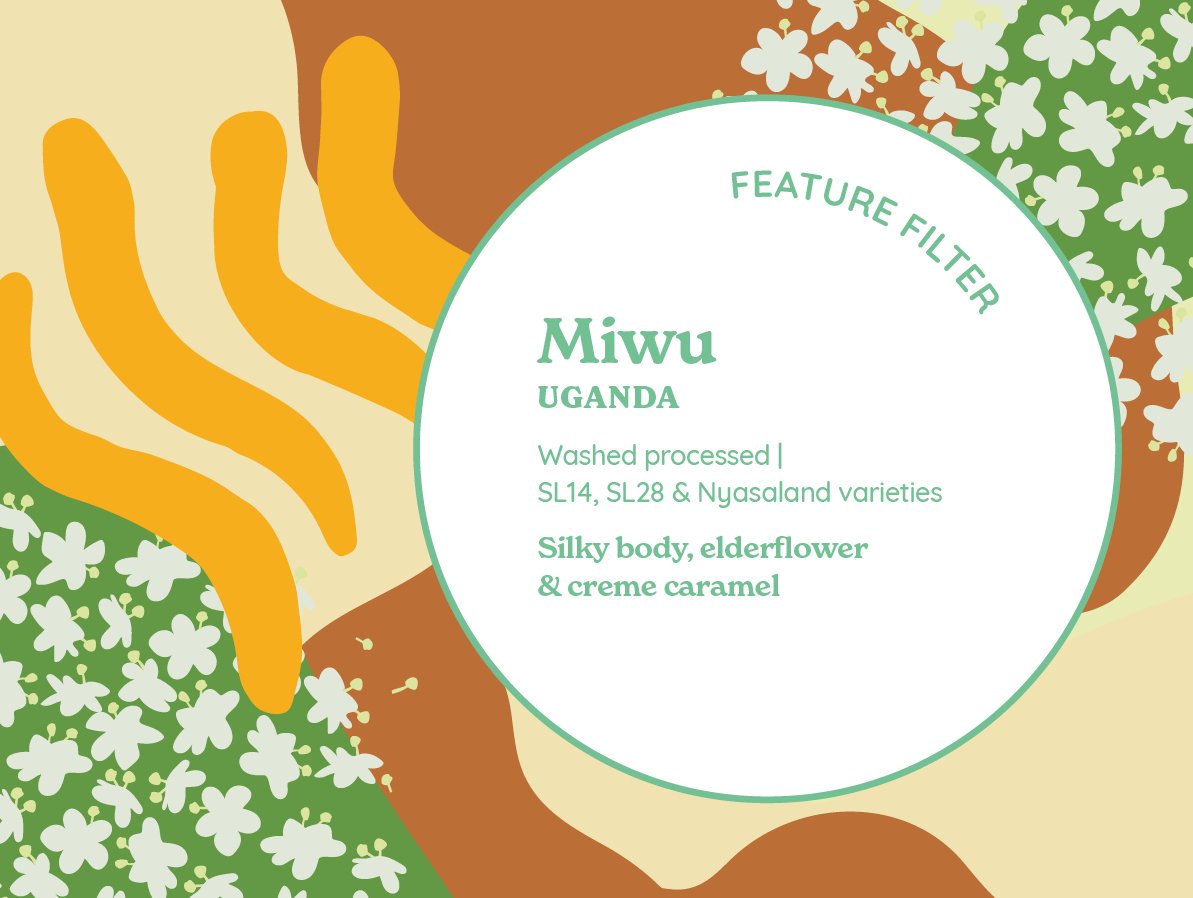Feature Filter: Miwu | Uganda
Key Origin Info:
Producer: small-holder growers based around the Bukyabo area in Sironko District
Processed at: The Coffee Gardens central washing station in Kyambogo Village
Region: Sironko District, Eastern Uganda
Altitude: 1800-2200 masl
Variety: SL14, SL28 & Nyasaland
Process: Washed; de-pulped, pre-washed and soaked before undergoing a submerged 40hr fermentation and being dried first in full shade for 3 days followed by drying for 2-3 weeks in solar driers (custom-built ventilated greenhouses)
Exporter: The Coffee Gardens | Importer: Falcon Speciality
Purchasing history: First year buy 2024
Cup profile: Silky & sweet, elderflower & creme caramel
Coffee plants flowering at one of the growers “coffee garden”.
About MIWU:
The coffee for this lot was cultivated and harvested by some 403 small-holder farmers who delivered cherry to the Coffee Gardens central washing station where it was processed using their signature washed method outlined above.
During harvest, growers deliver cherry to the washing station daily. In a given day, the station can receive between 200 and 16,500 kg of coffee cherries from between 3 and 170 individual farmers. Farmers may even bring as little as 1 kg at a time. Every single transaction is recorded and tagged to an individual farmer for full traceability. The coffee from each day from the same altitude band forms a “day-lot”. It is processed, tagged, quality tested and stored separately. Before export the team combine day-lots according to their flavour profiles and prepare these as “micro-lots”. These are then names after the local villages where the name Miwu comes from.
About The Coffee Gardens:
The Coffee Gardens project was established in 2017 by three friends - Dana, Michael and Shak - with the goal to produce specialty coffee in an ethical way, offering a transparent and direct link between our coffee farmers and coffee drinkers. Initially working with only 1 farming family in their first years, the operation quickly grew and now receives cherry from over 400 growing families.
As the CG team explains:
Quality is our reason for being. It allows us to pay farmers high prices and still invest in agricultural, social and environmental activities. Of course, the foundation of a good coffee is fresh, red, ripe cherries full of sugars to feed the fermentation process. In a time of intense price volatility, we work hard to create the right incentives so farmers decide to deliver only red cherries day after day. We also have rigorous sorting protocols in place starting in farmers’ gardens, and at every stage from our buying centres, throughout processing and all the way to export preparation.
Whilst quality is at the centre of their coffee production, The Coffee Gardens team work holistically to contribute to positive local development. With clearly defined objectives, they strive to improve farmers income and livelihoods, create and provide rural employment, promote gender equality, increase transparency and traceability throughout the supply chain, promote and work on environmental protection in the area and provide farmer training in Good Agricultural Practises (GAP).
The Coffee Gardens also incentivise and reward farmers through a number of different monetary and non-monetary ways. These include post-season bonuses, additional income-generating and employment opportunities, tree distribution and a range of all-year-round training programs. The Coffee Gardens is transparent with their partner farmers about buying policy and prices, providing each registered farmer with a contract and a buying-record book, communicating any price changes via SMS to registered farmers, and providing receipts for every transaction.
In their own words
We are more than a coffee buyer, processor and exporter. For our farmers, we try to be a reliable and consistent partner the whole year round. When we are not buying coffee, we deliver trainings and implement development projects.
When we consider impact, we think about economic, social and environmental elements - and these are all intertwined. A farmer with low income levels and limited savings may find it hard to follow sustainable practices and invest in their gardens. Instead, farmers may prioritise finding quick sources of income to meet urgent needs. So. by approaching the needs of farmers holistically, we are working to create long-term change.
You can find out more about their vision, impact and methods here.
We have been following the work of TCG for some time and are very excited to finally add one of their delicious coffees to our offering. We deeply respect and admire their dedication and work in producing excellent coffee whilst supporting rural communities and protecting the environment. We hope you enjoy this tasty lot all the more having learnt their admirable story.


